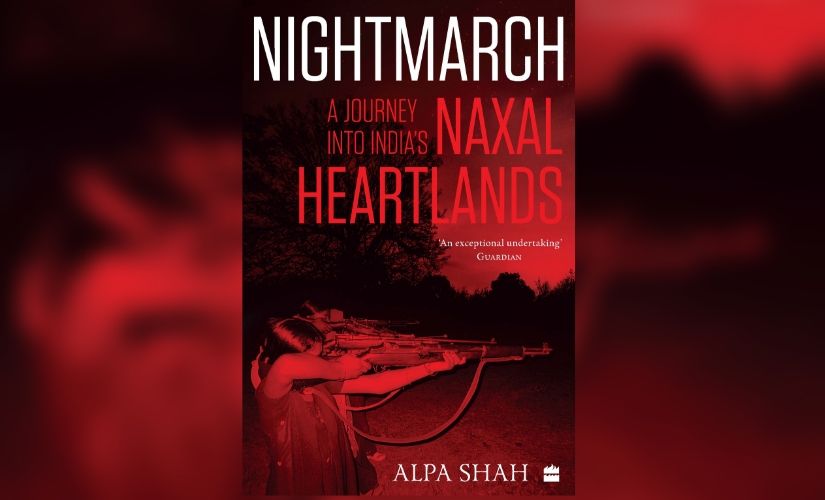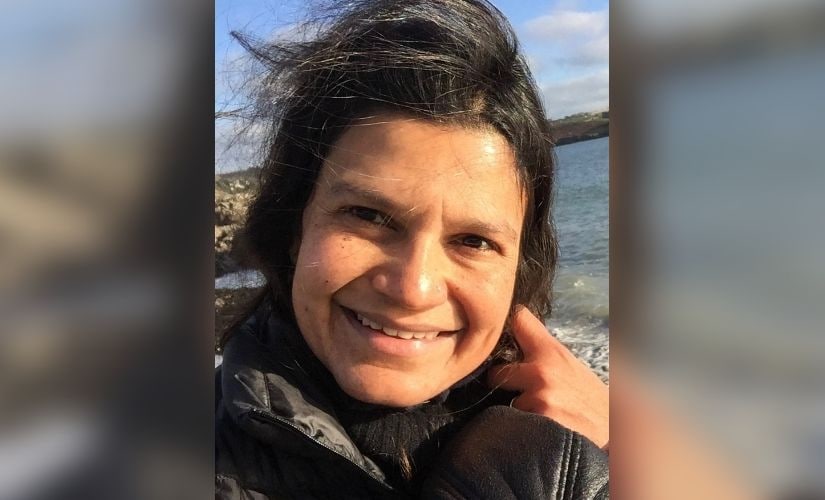My black hair was neatly oiled into a slick bun and I had wrapped a cheap flowery red and yellow chiffon saree around me to blend in among the local people. But taller and lighter skinned than the local women, I knew I still stood out in this male-dominated environment and thought that the ‘receiver’ would be able to identify me. Nevertheless, as agreed, I carried a loaf of bread. Object in hand, I approached the ‘receiver’. Clearly, the chosen attire was unusual for writer and anthropologist, Alpa Shah. However, it enabled her to travel incognito with her ‘receiver’ through India’s formidable ‘Red Corridor’ — an account poignantly documented in her 2018 book Nightmarch: A Journey into India’s Naxal Heartlands, which has been longlisted for the prestigious Orwell Prize for Political Writing this year. A professor of anthropology at the London School of Economics, Shah trekked with a Naxal platoon through a 250-kilometre-long stretch of the troubled belt in 2010. Unarmed, dressed in an olive-green guerrilla uniform, the writer was the only woman in the unit, but disguised as a man. “Hopefully, one of the outcomes of Nightmarch being longlisted will be that many more people will come to understand the story of India’s Adivasis and the Naxalites who have lived amidst them,” the anthropologist says. Among the longest running insurgencies in the country, for Shah, the story of the Naxals lay in the grey territory nestled between the black and white that’s painted in the popular imagination. “When it is told, it is often through tired tropes of, on the one hand, terrorism, coercion and greed or, on the other hand, grievance and identity politics. But, as Nightmarch shows, it is a much more complex and contradictory story, full of paradoxes and ironies, and one that is central to understanding not only contemporary India but also any struggle against inequality,” Shah explains. [caption id=“attachment_6710211” align=“alignnone” width=“825”]  Alpa Shah’s 2018 title, Nightmarch: A Journey into India’s Naxal Heartlands, has been longlisted for the Orwell Prize for Political Writing, 2019[/caption] Caught in the crossfire of a political deadlock between the Naxals and the state are the Adivasis, many of whom have lost their lives in the battle. While the seeds of the first rebellion were sown shortly after Independence in the state of Andhra Pradesh, it was in 1967 that India witnessed the beginning of the strife in Bengal’s Naxalbari village with an armed peasants’ revolution. Now, nearly half-a-century into the conflict, Shah believes that the biggest stakeholders continue to languish in subhuman conditions. While some Adivasis and Dalits may “appear better off today than (they did) 30 years ago” due to increased access to money, consumer goods and reservation policies, their growth barely holds water when compared to that of their upper caste counterparts, Shah observes. “Today their cheap labour is being used to build the infrastructure of India’s economic boom that others profit from. Many migrate for six to eight months of the year, far away from their homes, to carry out the worst and most precarious labour in the informal economy, work that most other people will not want to touch — whether it is the back breaking cutting of sugarcane or carrying bricks, gravel and cement on their heads and across their shoulders,” she explains. The Adivasis are mostly “paid a pittance”, and sometimes nothing at all. They live in slum-like conditions, and are often bound by labour contracts without rights and facilities. “[They are] hired one day, fired the next…Whereas it was once thought that stigmas of caste and tribe would disappear with development, they have, in fact, gained a new lease of life in the modern economy. Adivasis and Dalits continue to be abused as dirty, lazy, polluted, wild and savage.” Venturing into the Red Corridor comes with its share of threats that are almost always fatal. Shah’s endeavour of charting the Naxal story from ground zero was, understandably, a commitment like no other. It involved not just tangible lifestyle changes, but the unpacking of one’s ideals and privileges as well. “There are those like Gyanji – one of the central characters of the book – who came from relatively privileged, educated high caste well-to-do backgrounds, who gave up the comforts of their homes, cut ties with their families, ‘decasted’ and ‘declassed’ themselves, to be underground for decades on end,” Shah says. “Then there are Adivasi foot-soldiers like Kohli, a sweet 16-year-old, who was once assigned as my bodyguard. He had run away to live with the guerrilla armies after a fight with his father about a glass of spilt milk. Like many Adivasis, he moved in and out of the guerrilla armies as though he were going to stay with an uncle or an aunt. Then there was also Vikas, an Adivasi platoon commander, who Gyanji called a ‘Frankenstein’s monster’, who seemed to be with the Naxalites because he was earning money for his private purse, and who eventually came to betray the guerrillas. Or there was Somwari, the woman I lived with, who resented the guerrillas but at the same time went to seek help from them for a court case, who made me wonder if she needed Clara Zetkin [the German Marxist thinker] to liberate her…" The title chronicles her seven-night-long march through Bihar and Jharkhand, tailing a Naxal contingent, at a time when the government was amplifying its assault on the group. Former prime minister Manmohan Singh had termed the outfit as “the biggest internal security challenges facing our country” at a press conference held in the same year as Shah’s journey into the Naxal heartlands. This othering of the Adivasis has proved to be counterproductive for both sides in the longer run. “The state counterinsurgency forces have mainly seen Adivasis as ‘terrorists’, leading to a take over of their homes, forests and ways of life, rupturing and destroying their families and communities beyond recognition. I cannot even mention here the crimes that human rights activists say have been committed against their women. The prisons of central and eastern India are full of thousands of Adivasis imprisoned as alleged Naxalites, held for years without being brought to trial,” Shah rues. [caption id=“attachment_6710231” align=“alignnone” width=“825”]  Alpa Shah[/caption] With the death toll having stacked up over the years, the writer believes it’s time for a serious strategy overhaul on both sides. “India desperately needs a radically different approach to its Adivasis, one that deeply appreciates them and their ways of life on their own terms. Having said that, I think the ways in which the Naxalites are going about their fight for a more equal society is very dangerous, not only because of the repression they have brought to many ordinary people, but also because when one takes up arms, it is very easy to reproduce the violence of the oppressor you are fighting against and destroy yourself from within,” she says. In Maharashtra’s Gadchiroli district, a Maoist attack earlier this month claimed the lives of 15 policemen and a civilian. While Naxal activity in the state had seen a general slump since the 2009 Lehari and Dhanora attacks, the Gadchiroli incident has put state forces on the offensive yet again. Clearly, the socio-political logjam remains far from being resolved. And it is in search of these answers that Alpa Shah set out on her ‘nightmarch’, an allegory for the underground movement that’s “ripping through the subcontinent”. “In his famous essay ‘Why I Write’, George Orwell says that the initial motivation for writing was to get a hearing because there were lies to expose, facts to draw attention to, but also make that process into an aesthetic experience and to turn writing into an art,” Shah says about one of her biggest literary influences, who also lends his name to the award she’s been longlisted for. While the dream is to have Adivasis lead a life of unfettered autonomy, the cost of realising it has been far too heavy. Despite the interventions of several regimes and ideologies since Independence, the Naxal conundrum has remained obstinately unanswered. “Today, the forms of inequality, oppression and repression may have changed, but I think Orwell’s words ring as true as ever that in fact, ‘Everyone writes of them in one guise or another," Shah says. “It is simply a question of which side one takes and what approach one follows. And the more one is conscious of one’s political bias, the more chance one has of acting politically without sacrificing one’s aesthetic and intellectual integrity.”
Alpa Shah’s journey through India’s Naxal belt with a guerrilla platoon is documented in her 2018 book, Nightmarch. This year, the title has been longlisted for the prestigious Orwell Prize for Political Writing.
Advertisement
End of Article


)
)
)
)
)
)
)
)
)



